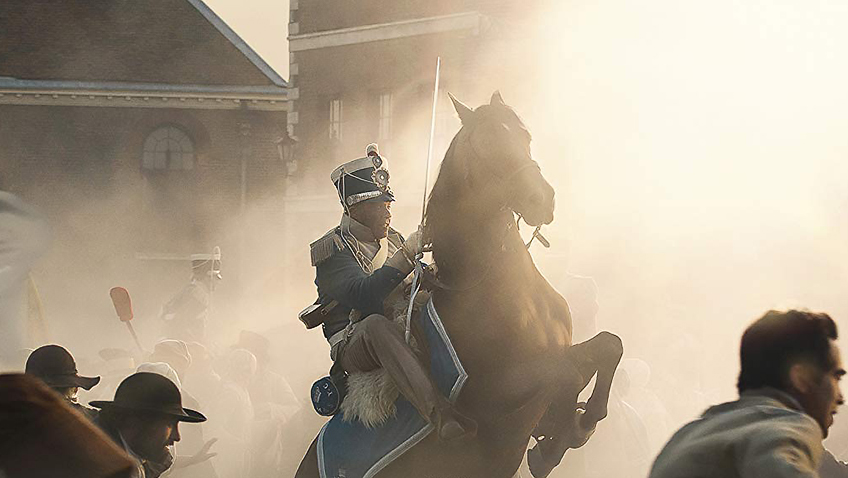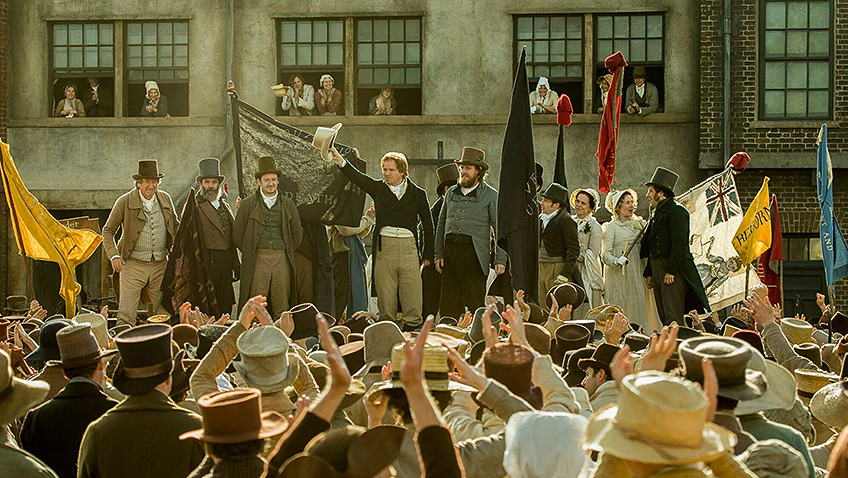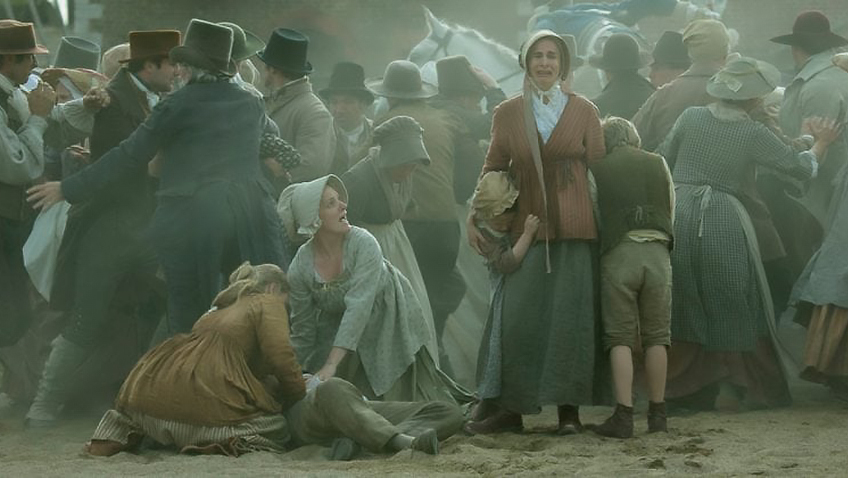Joyce Glasser reviews Peterloo (November 2, 2018), Cert. 12A, 154 min.
In his last movie, I, Daniel Blake, now 82-year-old social-realist filmmaker Ken Loach delivered what is arguably his most passionate, angry and pointed polemic against modern day Britain, while, for his last film, that other veteran director known for his social-realist films, 75-year Mike Leigh, delivered the artist biopic, Mr. Turner. With Peterloo, Leigh turns angry, and, like Loach, relies on broad strokes to tell his story. Leigh recreates the background of the massacre known as Peterloo, and the massacre itself, with a passion – and a lack of subtlety – seldom displayed in his long career. The timing is not coincidental. The depiction of the food banks in Loach’s modern day film here finds an equivalent in the working class discussions on the repeal of the Corn Laws and the lack of working class representation.
Leigh’s regular cinematographer, 71-year-old Dick Pope, who was nominated for an Academy Award for Mr. Turner is not only the film’s DOP, but operates the A camera with stupendous results. We are there, at the end of the bloody battle of Waterloo, where a shell-shocked young bugler named Joseph (David Moorst), half blind and limping, makes his way back to his family of mill workers in Manchester. This opening battle, which foreshadows the St Peter’s Field massacre and gives it its sobriquet is also ironic as we meet up with Joseph wearing the same red soldier’s uniform in St Peter’s Field four years after he risked his life for king and country.
Returning to Manchester, young, starving Joseph searches in vain for work as his family discuss how the Corn Laws that protect the large landowners (many of whom are in Parliament), are making their basic foodstuffs unaffordable. This is contrasted with a vote in Parliament rewarding Wellington with a pension of £750,000.
Joseph, and his father Joshua (Pearce Quigley), a kind of Everyman, start to attend meetings with like-minded workers and more informed radicals. His warm-hearted mother Nellie (a make-up free Maxine Peake) is too preoccupied with feeding her family and too realistic to harbour much hope.
Manchester itself has no elected representative and if it did, the working class would not have the right to vote. The vote and the Corn Laws are the basic gripes that a large group of factory workers, shop keepers, teachers and publishers want to see addressed, and toward this end the Manchester Observer invites the famous reformist orator Henry Hunt (Rory Kinnear) to Manchester. While this is the central premise of the film, there is a lot of talk before we get to Hunt’s aborted speech.
First, we visit a major textile mill where changes in technology and large scale production called for a centralised work force that changed the nature of society and swelled the nation’s cities. The working conditions are terrible. In one scene when the workers skip work to attend Henry Hunt’s speech, an irate mill owner screams, ‘Scum, that’s what they are. I put food on their table and this is how they repay me!’
But this mill owner’s view of his workers is nothing compared to that of the lord mayor, the magistrates and politicians, caricatures all, with their ignorant, condescending views expressed in their grotesque faces. ‘They are children; the rod is all they understand,’ says one magistrate. After scenes of city governors stuffing their faces with opulent dinners, one fairly intelligent man points out that ‘the labouring classes are ruled by their stomachs and suggests that a slight raise in their wages would quell the uprising.
This suggestion (and the speaker) is quickly quashed by the general consensus that ‘the remedy for liberty is the iron hand of the law.’ We get a glimpse of that law in a series of trial scenes in which the outrageously disproportionate sentences handed out by sadistic magistrates are reminiscent of Jean Valjean’s in Les Misérables.
Early on we witness the appointment of John Byng (Alastair Mackenzie) as head of the Northern District, a distinguished general who knows nothing about the North, and cares even less. Knowing that one of the largest peaceful demonstrations in English history would be convening on his patch on 16 August, General Byng goes to the race track to keep his hands clean. Lord Sidmouth (Karl Johnson) and Dr Healey (Ian Mercer) are particularly revolting, but special treatment is reserved for the slothful, despicable Prince Regent (Tim McInnerny).
The film has a force and momentum of its own, as increasingly large and varied reform groups – and their ruling class counterparts – meet to decide on a course of action and air their grievances. The groups multiply as does the 19th century verbiage, making this 154-minute film a challenge for all audiences.
While the nuanced, humane script we associate with Leigh has been sacrificed to underscore injustice and historical accuracy, the non-ruling classes (and every sub-strata of society is represented) are not all united. A traitor/collaborator offers to spy in exchange for money, and there are those who, unlike Hunt, believe armed insurrection is the only way. Journalists need a good story, while two women cannot understand the rhetoric in the Female Reform Society meeting they attend.
One of the problems that prevent a more emotional involvement in the events of the film is that we do not experience events through the eyes of one particular character. And all characters, with the exception of Hunt – brilliantly portrayed by Kinnear with the intelligence, principled nobility, polite arrogance, contradictions and blind spots of the real man – are so broadly sketched as to be cartoons rather than real people.
Of course the combined effect of the meetings and discussions is leading up to the final showdown. There is a tension in this momentum and in the long, almost wordless, horrific depiction of the massacre of the innocents. And, since we know the outcome, there is a stomach-churning dread hanging over every scene as we see how all the pieces slide into place to create the conditions for what is arguably the most disgraceful single event in 19th century British history.
You can watch the film trailer here:







